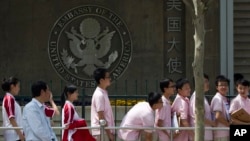Student Union
- By Zohra Moradi
Investigated, Not Interviewed, for US Student Visa

"Are any of your family members involved with the Taliban?" was among the many probing questions the U.S. Consulate asked me when I interviewed for my F-1 visa to study in the United States.
That's not unusual in Afghanistan, where the U.S. and my country have been allies in fighting the Taliban since the September 11, 2001, terror attacks that brought down four planes, destroyed New York's World Trade Center, damaged the Pentagon and killed almost 3,000 people.
The answer to the question was no, and six years ago, I came to study in the U.S. at age 17 at a high school in Connecticut on a private scholarship sponsored by a generous couple in New York City. I am now a rising junior at Trinity College in Hartford, Connecticut.
Not all Afghan students are so lucky. Only 422 came to the U.S. for a higher education last year on F-1 student visas, according to the Institute of International Education in New York. That's a tiny fraction of the more than 1 million international students admitted to the U.S. each year to study.
The effort is not purely educational. The U.S. grants student visas from Afghanistan and other nations as part of a diplomatic effort to share and export democratic ideals and practices.
The application to obtain an F-1 visa is long and asks for personal and family information, proven by photos and documents, including an acceptance letter from an accredited college or university.
In my case, an I-20 form confirmed my enrollment in the high school, and the bank statements of my sponsors proved that I had the financial means to stay in the U.S.
My older sister, who arrived in the U.S. at age 15, helped me with paperwork, and we practiced in a mock interview to help me answer the consulate's questions accurately and succinctly.
I prepared well in advance. Questions can be very challenging: "Are any of your family members involved with the Taliban? Do you have a sponsor? Will you return to your country?"
I was nervous, afraid I'd forget what to say. Because Afghanistan is poor and unstable, the U.S. embassy in Kabul fears that once Afghans leave, they might not return. So the agents are very cautious and serious. I felt I was being investigated, not interviewed.
Many Afghan students failed the interview and were denied an F-1 student visa to come to the U.S. Before me, a young woman was quickly turned down because she seemed unprepared. She said she wanted to study in the U.S. because it was a beautiful country with great weather.
Others I know were on wait lists for weeks and months for background checks. In my case, at the end of my interview, I was handed a card saying my visa would be approved. I was excited and relieved! The visa arrived a week later.
The difficulty of getting a visa depends on where you live. Ahmad Tair, a rising junior and classmate at Trinity, said the process to get a student visa in Saudi Arabia is similar to Afghanistan. Prospective students must fill out an application, provide the right documents, and undergo an intense 15-minute interview in which they are asked similar questions: "Why do you want to study in the U.S.? Will you return to your country? Who is paying your expenses?"
However, Sababa Anber, a classmate from Bangladesh, said her interview was brief and non-threatening. The questions were similar, but the tone was less intense.
"I felt great about my interview," Anber said. "It was literally five minutes probably, or less! The interviewer was super nice."
Students from China, India and Japan also reported stress-free interviews.
"I was nervous to not mess up the process and provide the right documents, because if I did, I would have to do it all over again," said Takanori Tanifuji from Japan, a rising junior.
"But I was confident that I would get a visa and was not nervous during my interview," she said.
Rising senior Aadiv Sheth from India described his interview as "chill."
"My interview was very short, like two to three minutes, but it did sound a little professional," Sheth said.
"I did not feel nervous in my visa interview because as far as I knew, almost every student got a student visa," said Doris Wang, a 2021 Trinity graduate from China, which sent more than one-third of the more than one million international students admitted to the U.S. in the year before the coronavirus pandemic limited travel.
My own country's education system has been disrupted by years of war. My parents have encouraged my sisters and me, not just my brothers, to get the best education possible, despite cultural pressures not to encourage women toward education.
After six years of studying in the U.S., I miss my family and my homeland. I care about my people and want to help them after my studies are complete. When I go home, as I did three years ago, I worry about being granted a visa to return to the U.S. and being barred from completing my schooling.
But I am drawn to a world in American education that has included me in fast-moving globalization. Ideologies here and abroad are competing and changing, challenging people to new and different ways of thinking. I am immersed in these changes and intend to use what I've learned wherever I go.
See all News Updates of the Day
- By VOA News
International students discuss US campus culture shock

International students at De Anza College in Cupertino, California, talked about culture shock in an article in La Voz News, the student newspaper.
"It felt like a major culture shock. Everything was so different, from academics to mannerism," said a student from Mexico.
Read the full story here.
These are the most expensive schools in the US
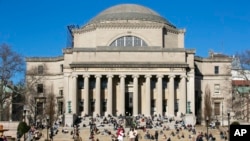
High tuition costs along with housing and food expenses can add up for students at U.S. colleges and universities.
MSNBC looked at the most expensive schools in the country, with one costing more than $500,000 for a bachelor’s degree. (June 2024)
Uzbekistan students admitted into top US universities
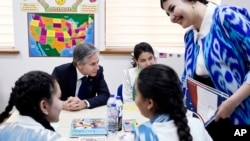
Students from Uzbekistan are among the international students admitted to top colleges and universities in recent years.
Gazata.uz profiled some of the Uzbekistan students attending Harvard, Brown, Princeton and other U.S. universities. (June 2024)
- By Stella Hsu
Reports of visa checks, deportations worry Chinese STEM students in US
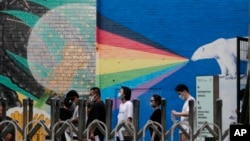
Geopolitical tensions and growing competition in tech between the United States and China appear to be spilling over into academia despite commitments from the world’s two biggest economies to boost people-to-people exchanges.
The United States remains the top choice for Chinese students seeking to study abroad with nearly 300,000 studying in American colleges and universities during the 2022-2023 school year. But reports of some cases that students and professors are facing extra scrutiny while passing through immigration and the deportation of others are raising concerns.
For Chen Xiaojin, a doctoral student studying semiconductor materials at a university in the Washington, D.C., metropolitan area, it has been six years since she returned to her hometown of Beijing.
At first, it was the COVID-19 pandemic that kept her from going home. But over the past two years, she has been deterred by accounts of Chinese students majoring in science and engineering being required to reapply for their visas upon returning to China.
She also says she is worried by reports over the past six months of Chinese students being deported, even at nearby Dulles Airport.
"My current research is relatively sensitive, and my boss [adviser] is getting funds from the U.S. Department of Defense, making it even more sensitive,” she told VOA. "I am afraid that I won't be able to return after I go back [to China]."
Chen says that if she did return to China, she would have to apply for a new visa.
In a report late last month, Bloomberg said it had found at least 20 Chinese students and scholars with valid visas who were deported at U.S. Customs since November and barred from reentry. The U.S. Customs and Border Protection Agency does not release relevant data.
Immigration attorney Dan Berger represented one Chinese student who was deported late last year. He tells VOA Mandarin that the student studied biological sciences at Yale University and was about to complete her doctorate.
She visited her family in China and got a new visa but was deported by customs at Dulles Airport and barred from reentering the country for five years. Berger said he did not see anything suspicious in the transcript of the conversation between the student and the customs officer.
"We have seen what seems like a pattern over the last six months of Chinese PhD students being turned around…. more than I've seen in quite a while," he said.
Matthew Brazil, a fellow at the Jamestown Foundation, said neither country seems willing to explain the situation. However, he believes that in most cases, the United States must have valid reasons for blocking visa holders from entering the country.
In some cases, the student’s background may not match what is written on the visa application. In other cases, customs agents may also find something that the State Department missed, and once they see it, they are responsible for taking action.
"I wish the Chinese side would be specific about their students who were refused entry,” he said. “The fact that both sides are mum on details and that the Chinese side is engaged with the usual angry rhetoric means that each has security concerns. And that says to me that there was good reason for the U.S. to stop these particular applicants."
Brazil also sees a connection between the entry denials and export control regulations issued by the United States in October 2022 that restrict China's ability to obtain advanced computing chips, develop and maintain supercomputers, and manufacture advanced semiconductors.
U.S. Customs and Border Protection is one of the law enforcement agencies authorized to investigate violations of export control regulations, he said.
"Beijing's intelligence agencies are known to focus attention on PRC [People's Republic of China] students and scientists headed abroad who study or work on dual-use technologies controlled under the Export Administration Act — compelling Chinese students and scientists to report on what they've learned when they return to China on holiday,” he said. “This has been true for decades."
Bill Drexel, a fellow for the Technology and National Security Program at the Center for a New American Security, said the U.S. government did find some cases where students tried to steal strategic technology for China.
"I think it would both not be surprising that they found some really questionable or incriminating evidence for some students,” he said. “It would also not be surprising if, in their hunt for really solid evidence, they also may have made some mistakes on other students.”
Drexel adds that “it’s just kind of an unfortunate fact of the time that we live in and the tactics that the CCP uses when it comes to these measures."
In a post on X in early May, U.S. ambassador to China Nicholas Burns tried to dispel concerns about visas and entry to the United States for students and scholars. In the post, he said "99.9% of Chinese students holding visas encounter no issues upon entering the United States.”
In an interview with The Wall Street Journal Monday, Burns said it is China that is making it impossible to promote people-to-people ties. Burns told the Journal that students attending events sponsored by the United States in China have been interrogated and intimidated.
He also said that since U.S. President Joe Biden and China’s leader Xi Jinping held their summit in San Francisco last year, China’s Ministry of State Security and other agencies had interfered with Chinese citizens’ participation at some 61 events.
At a regular briefing on Wednesday, Chinese Foreign Ministry spokesperson Mao Ning dismissed those accusations, saying that they did not “reflect reality" and that went against key understandings reached by both countries’ presidents in San Francisco.
“The United States, under the pretext of 'national security,' unjustifiably harasses, interrogates, and deports Chinese students in the U.S., causing them significant harm and creating a severe chilling effect,” Mao said. “The image of the United States in the minds of the Chinese people fundamentally depends on the actions of the United States itself.”
Drexel said he believes Burns’ comments about visas and students' willingness to study in the U.S. still ring true.
“On balance, it's still the case that American universities are overwhelmingly warm towards Chinese students and want them in large numbers," he said.
However, Berger, the immigration lawyer, is concerned about the chilling effect recent cases involving Chinese students could have.
"In general, we are being more careful about advising Chinese graduate students in STEM fields about traveling and letting them know that there is some small risk,” he said.
Even though the risk is small, it does seem to be real at the moment, he said.
Adrianna Zhang contributed to this report.
US federal judge blocks new regulation targeting for-profit colleges
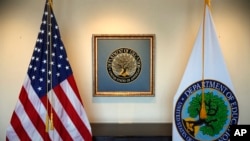
A federal judge in Texas has blocked a regulatory provision targeting for-profit colleges that was scheduled to take effect in July 2024.
Times Higher Education reports that the rule, which would affect student loans, was challenged by for-profit institutions. (June 2024)





